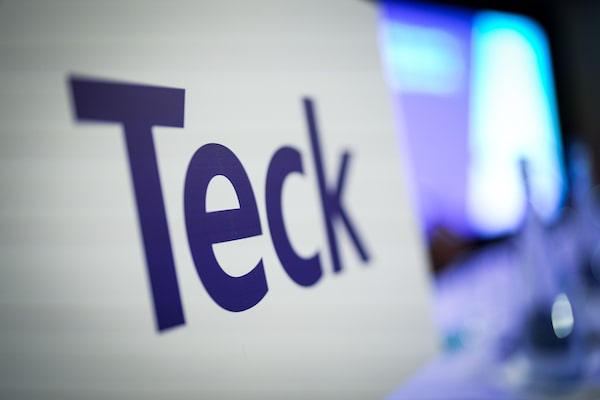
Glencore signalled an interest in owning even a piece of Teck by buying its substantial metallurgical coal operations,DARRYL DYCK/The Canadian Press
The bosses of Canada’s Teck Resources Ltd. TECK-B-T and Switzerland’s Glencore PLC GLNCY have used a mining conference to present starkly different views on how Teck could create value and whether Ottawa would approve a proposed merger of the two companies.
At the same time, Glencore opened the door to buying Teck’s substantial metallurgical coal operations, signalling an interest in owning even a piece of a company attempting an uncertain corporate overhaul.
Meanwhile, Teck continued to resist overtures from Glencore, the world’s largest commodities trader and one of the biggest mining companies, which offered to buy Teck in March in a US$22.5-billion all-share deal. Teck rejected the pitch and is pursuing plans to separate its metallurgical coal operations from its base metals business.
At the Bank of America Global Metals, Mining and Steel Conference in Barcelona, Glencore chief executive officer Gary Nagle said Tuesday that Teck would have trouble financing its ambitious copper expansion strategy on its own. “They want to develop five projects at once with a lot of debt on their balance sheet,” he said, according to notes from a Bank of America analyst. “There certainly would have to be capital calls to shareholders.”
In a public presentation later in the day, Teck CEO Jonathan Price instead highlighted the company’s “strong” financial position just as its biggest project, the QB2 copper mine in northern Chile, ramps up production. He said the company paid off $1.3-billion in debt in 2022, will deleverage again this year, has no debt maturities related to QB2 until 2030 and has US$8-billion in liquidity.
Teck will still pursue plans to split the company in half, creating a stand-alone coal business and a base metals company. Mr. Price said the metals company could be worth $100 a share because investors crave exposure to critical battery and renewable energy metals such as copper. In Toronto, Teck trades at about $60 a share, giving the company a market value of $31-billion.
Any new plan would be a “simpler and more direct” derivation of the previous plan, which envisaged spinning off the coal business into a company called Elk Valley Resources. Elk Valley, in turn, was to pay most of its cash flow to the new Teck metals company for about a decade.
Mr. Price gave no clues as to the timing or the structure of any new plan to split the company.
Last month, Mr. Nagle said the deal would create a “zombie” coal company. Teck shareholders apparently agreed; unable to gain enough support for the spin-off, Teck called off the April 26 shareholders vote that was to approve the DEA, leaving Glencore’s offer the only active proposal on the table. Glencore wants to merge its base metals assets with those of Teck’s, then create a separate company to hold the two companies’ thermal and metallurgical coal operations.
In a twist to the potential split of Teck, Mr. Nagle did not rule out offering to buy Teck’s coal business – though he made it clear that a merger of the two companies remains his goal. “Doing the full deal is the best offer for both sets of shareholders – it creates the most value,” he said. “Buying their coal business stand-alone is a distant second in terms of potential benefits.”
Glencore is one of the few big mining companies interested in taking on more coal. Almost all its rivals want to sell or spin off their coal assets in an effort to make themselves more appealing to investors who demand net-zero emissions commitments. Some small companies and investment groups are interested in buying any coal discarded by the big players. An investor group led by Canada’s Pierre Lassonde, co-founder and chair emeritus of Franco-Nevada Corp., is proposing to buy Teck’s coal operations.
Mr. Price said Glencore’s offer remained a non-starter, arguing that it undervalued Teck and was “ultimately a proposal with a very high risk associated with the regulatory approval process.” Various provincial premiers and federal cabinet ministers have said they want to see Teck remain “Canadian,” even in the absence of a rival bid from Canadian mining companies.
Teck’s purchase by a foreign company would be judged on net-benefit and security grounds in Ottawa, putting any signed deal in regulatory limbo for a year or more. Mr. Nagle, however, said in Barcelona that he was confident a review would go in Glencore’s favour. “We don’t see Canada as an executional challenge,” he said. “We’re a major producer and operator in Canada. We’ve been there a long time.”
Glencore has about 9,000 employees in Canada and owns the Viterra grain-handling business and the nickel miner formerly known as Falconbridge. It boasts that it has more mining assets in Canada than Teck, whose base metals mines are mostly outside the country.